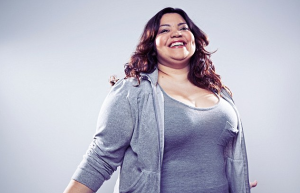
Source: The Daily Mail
Imagine this: A woman tells a story on her personal blog about how she learned to stop hating her body. She writes of the journey that took her out of self-loathing and into self-confidence.
She gives her readers helpful advice about not comparing themselves negatively to others, and she talks candidly about how hard it was for her to learn to see herself as beautiful, but how wonderful it was when she finally got there.
It’s a story that, at face value, many people would celebrate. Everyone loves a good, body-positive message, right?
That is, of course, if the woman who writes the story is relatively thin.
If she’s fat, though? Well then, what right does she have to write about loving her body?
Those who dare to write positively about all bodies – bodies of all sizes, races, genders, abilities, and disabilities – know exactly what happens to this woman after she publishes her blog post:
She should brace herself for wave after wave of negative comments, criticism of her weight, accusations that she is a bad influence on society, and assumptions about her eating and exercise habits.
Discussions about weight and body image show up all over the place in real life conversations and online, but only periodically do we see stories about women who are fat, happy, and unapologetic about that.
More typically, stories about weight and happiness tend to be rooted in fat women losing weight, or perhaps thin women realizing they need to stop thinking of themselves as fat, or women who are just a little fat embracing that about themselves. Radical statements of body love from fat women are rare.
But it’s no wonder those stories and statements are hard to find!
There is a massive industry that sells women the idea that without weight loss, there is no happiness. The Militant Baker recently wrote a piece about a fascinating concept called “body currency,” stating:
It goes like something this: We are taught as a society that if we achieve the ideal body that we see in traditional media (and not before) we will then obtain love, worthiness, success, and ultimately, happiness.
She suggests that when a fat person rejects this notion and refuses to buy into the idea that love, worthiness, success, and happiness are only possible for thin people, then people who still hold onto that currency become irate.
Some of the angry people are thin, some fat, some formerly fat, some formerly thin. The anger comes from a lot of different directions.
That’s just one theory for why there is such intense pushback when a woman dares to be fat and happy.
The Internet doesn’t just take poorly to women who are fat and happy, though!
Look at the comments section of any article in which a woman dares to be fat and merely exist, and you’ll see a hatred and fear of fat bodies.
When the woman in question says she’s happy or rejects the notion that she must change her body, then the outrage becomes more intense.
No wonder women don’t come out and say “I’m fat and happy.” Who would want to face some of the Internet’s worst vitriol?
When I have watched these conversations unfold, I’ve seen one concern voiced over and over again that doesn’t really make sense to me. It’s the concern that the fat, happy women of the world are setting up a bad example for—I don’t know—“the children,” I guess.
There is this idea that if a woman celebrates her fat body as beautiful and worthwhile, then she is a bad influence on those around her.
Conversations about weight and happiness almost always deteriorate to the conclusion that a woman who is okay with her fatness will ultimately, inevitably lead to society becoming less healthy.
This concern is dependent on a specific hypothetical narrative that goes like this:
- A fat woman celebrates her body and says she doesn’t need to change. (Think back to our hypothetical blogger.)
- Impressionable children hear her making such statements, and they decide that they don’t care about being fat either. (You could also replace “impressionable children” with “other fat people.”)
- The impressionable children and other fat people decide to stop eating nutritiously, stop exercising, and stop cultivating other healthy habits.
- Everyone ends up fat and unhealthy, and their happiness is therefore irrelevant. After all, “You can’t be happy and unhealthy!” say the critics (in a pretty blatantly ableist statement that denies the existence of all sorts of people who are chronically ill and yet, miraculously, living full lives).
The idea that this hypothetical narrative is the only realistic outcome of someone being fat and happy is absurd! I reject it.
First, I reject it because the very small amount of women saying “I’m fat and okay with it” is never going to outnumber the billions of dollars available to companies who are prepared to sell us the message that being fat is disgusting, dangerous, and shameful.
Second, I’m not comfortable with the idea that health can be easily defined, let alone that it can be divided into categories of “fat” and “not fat.”
We need to be careful to avoid promoting the idea that a person can only be happy when they’re healthy.
I’ll use my husband as an example: He suffers from a number of chronic health conditions related to things outside of his control, but he still has a right to be happy and to pursue his own definition of health.
He may never be able to go hiking and camping and mountain biking, but that doesn’t mean he’s not healthy.
Third here’s the thing: We’ve been expecting fat people to be distraught about their weight for decades, and it hasn’t made us any healthier! Or skinnier!
Clearly, the “be ashamed of your fatness” angle isn’t working in terms of getting us healthier. It is only working to make us buy more crap.
In rejecting this hypothetical, I’d like to offer a few more to replace the old one. These situations are, I think, more realistic than the idea that celebrating fatness leads to the overall decline of health.
Here’s what could happen if women get the chance to be okay with their fat. Imagine that our fat blogger’s post about her body gets some traction. Then it goes viral.
In response, the Internet comes out to rail against what a bad example she is. And yet, what if these things happen instead:
1. One of the readers is a woman who is the author’s size, and she has always been ashamed of her body.
So ashamed, in fact, that she has avoided public exercise her entire life. Since childhood, when she was made to feel bad for her body in gym class, she has avoided exercise.
She hates the idea of going to the gym because of how she looks in gym clothes, on the machines, with a sweaty face.
But when she reads the blog post about the beautiful body that looks like hers, she gains some confidence. She decides that there’s nothing wrong with her; she doesn’t have to be ashamed of going to the gym and exercising.
With some time, she gains the confidence she needs to go to the gym and get a trainer. She gets stronger. She gets fitter. Her health improves.
Maybe she loses weight, or maybe she doesn’t, but that’s not really the point; the point is that she is now more confident and stronger than before.
2. Another reader has been a fad dieter for decades. Whatever is new, that’s what she tries.
Her weight has yo-yoed up and down over the years, and her doctor is concerned about what the constant loss and gain is doing to her.
The doctor is also concerned that this woman has tried some pretty unsafe dieting practices that put her health at risk –things like weight loss supplements, appetite suppressants, abuse of laxatives, and dangerous “detox” programs.
When she reads the post and sees that someone heavier than her is happy and okay, she begins to wonder what she’s doing to herself.
She begins to embrace the idea that health is more important than size. She rejects the next fad diet that comes along, and the one after that. She doesn’t make a New Year’s resolution to lose weight.
Her weight steadies for years, and her body begins to recover from decades of mistreatment. She makes better choices, and she lives longer because of it.
3. A third reader realizes that she’s been sending terrible messages to her daughter about why they need to make healthy food choices.
She makes a commitment not to use “You’re going to get fat if you eat that” as a threat, and instead encourages her daughter to choose nutritious, nourishing foods over sugary, non-filling ones.
The daughter grows up with a far healthier role model in her mother, and she learns the benefits of a diverse, healthy diet.
***
Why aren’t these the stories we hypothesize when we read about a fat, happy woman who loves her body the way it is? Why accept the idea that being okay with being fat is going to make the people around us less healthy?
Instead, let’s promote the idea that health can be promoted by anyone, with any body.
These are the scenarios I’ve watched unfold as women have stopped hating their weight, and they are the scenarios that will become more and more common as fat-positive stories get told more often.
Let’s reject the narrative that makes money for the industry that sells you dissatisfaction and comparison. Instead, let’s embrace the narrative that promotes real health!
[do_widget id=”text-101″]
Liz Boltz Ranfeld is a writer and English teacher in Central Indiana. She teaches English composition and creative writing at a small Christian liberal arts university, and writes nonfiction. In 2011, she graduated from the University of New Hampshire’s Creative Nonfiction MFA program. Her thesis was a memoir about the ethical and moral implications of sending teenage Christians abroad to save the world for God. She blogs weekly on her website and you can follower her on Twitter @LizBR.
Search our 3000+ articles!
Read our articles about:
Our online racial justice training
Used by hundreds of universities, non-profits, and businesses.
Click to learn more




















